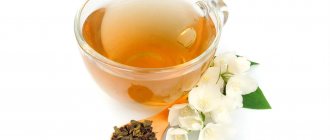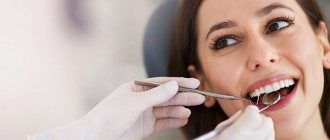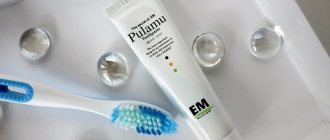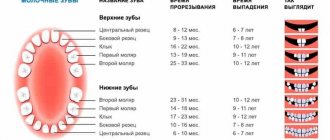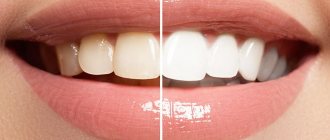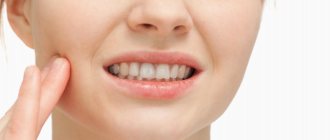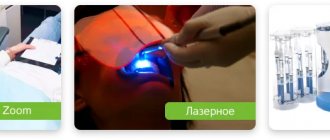Author of the article:
Soldatova Lyudmila Nikolaevna
Candidate of Medical Sciences, Professor of the Department of Clinical Dentistry of the St. Petersburg Medical and Social Institute, Chief Physician of the Alfa-Dent Dental Clinic, St. Petersburg
A snow-white smile is an adornment no worse than any diamonds; it makes a person more attractive and attracts others. Therefore, it is not surprising that many people want to have bright white teeth, like the stars on TV. But there is a problem - even healthy enamel can turn yellow or darken over time. Its color is changed by dyes found in food, cigarette tar, some medications and much more.
You can get rid of an unpleasant shade with the help of professional bleaching, but this is quite harmful and is not always affordable, although it is effective.
There is an easier way - to properly plan your diet. Some products can naturally lighten enamel. In this case, you will not get a Hollywood smile, but you will be able to make the yellowness less intense. In addition, the diet will also be good for those who have undergone whitening procedures - this is a great way to maintain a radiant result.
Plus, a balanced diet means good health and a slim figure, try it. So, what foods whiten teeth?
Oranges
The fruit contains a lot of vitamin C and many useful substances; it contains no fat or dyes. Orange is a good snack, and in addition, it can lift your spirits. In addition, the fruit acts as a natural bleach. You can simply eat it, add it to salad or drink water.
Pineapples
Pineapples, like oranges, contain special enzymes that destroy pigment. In addition, they increase salivation and neutralize harmful bacteria, which also helps maintain white teeth.
Strawberry
This berry contains an acid that can discolor yellow stains on teeth. There are many recipes for teeth whitening using strawberries. The easiest option is to rub it on the enamel surface and wait a few minutes. Next, you should rinse your teeth. The acid not only bleaches the pigment, but also works as a disinfectant. It has a positive effect on the health of the entire oral cavity, preventing the growth of bacteria.
Nuts and seeds
These foods are an excellent source of fat, protein and fiber. They are very beneficial for dental health, as they have a slight abrasive effect. In a gentle mode, nuts and seeds polish the enamel and remove the soft yellow coating from it. After eating them, it is better to rinse your mouth so that nut particles do not remain in the spaces between your teeth and become food for bacteria.
Apples
Apples mechanically clean teeth. In addition, when we bite and chew them, a natural massage occurs on the gums. Plus, malic acid can lighten your teeth a little. You can simply eat an apple or, for greater effect, rub it on the surface of the enamel and leave for a few minutes. Next, you should rinse your teeth. You should not carry out this procedure too often, since acid can also be a good irritant for the gums.
Celery
Celery provides gum massage, cleans teeth, and also stimulates salivation. Saliva prevents the formation of yellow plaque, as it washes away bacteria that settle on the enamel. In addition, celery contains calcium, vitamins, and fiber, which are necessary for the health of both teeth and the body as a whole.
Carrots and broccoli
These products also perfectly remove soft plaque from tooth enamel, plus they increase salivation, which helps cleanse the oral cavity of food debris and accumulated bacteria. Carrots and broccoli help eliminate bad odor. They contain a lot of calcium, vitamin C and fiber, which help maintain healthy teeth.
Turmeric
Turmeric is a plant of the ginger family, which, due to its spectacular taste, is often used both as an independent seasoning and as part of various spicy mixtures and sauces; it is one of the main components of curry.
Products that stain enamel
The enemies of your snow-white smile are the most common drinks and foods: tea, coffee, red wine, colored lemonades, berry juice, dark berries, soy sauce, chocolate and others. In addition, any sweets spoil dental health, since sugar creates a good breeding ground for bacteria. They produce acid that destroys enamel. Teeth become yellow and brittle.
So, if you want your smile to be snow-white, watch out for the consumption of these products. Especially if you have recently had a whitening or hygienic cleaning. In this case, you should stick to a white diet. Otherwise, the enamel will quickly return a yellow tint.
The influence of nutrition on dental health
To maintain oral health, a number of microelements are required - calcium, fluoride and phosphorus. A person gets them from food. If the diet contains few healthy and micronutrient-rich foods, the enamel weakens and is more difficult to restore.
Dental plaque is a thin, invisible film on the teeth that maintains the health and microflora of the mouth. When a person eats sugary or starchy foods, it reacts with plaque to form acids. These acids attack the enamel, destroying it.
Consuming sugar in small quantities will not lead to tooth decay or inflammatory diseases. But if harmful foods are constantly in the diet, then undesirable consequences will certainly arise, and treatment of caries cannot be avoided.
Excess sugar and lack of calcium and phosphorus leads to caries and inflammatory diseases of the oral cavity.
How to maintain a healthy and white smile
Proper nutrition helps maintain healthy teeth and improves their condition. In addition, as we indicated above, it is able to maintain the effect after professional whitening.
But, of course, proper nutrition alone will not help you maintain a snow-white smile. It must be combined with careful oral hygiene. This will not only strengthen your teeth, but also help strengthen the overall immunity of the body.
To ensure that your care is as effective as possible, use high-quality professional products.
A series of professional dental care products “Asepta”
“Asepta” is a wide range of oral care solutions that allows you to solve problems with bleeding and inflammation of the gums, pathogens, and increased sensitivity of teeth. This is a great way to maintain a high level of oral hygiene and ensure disease prevention.
- ASEPTA ACTIVE is a therapeutic and prophylactic paste for gentle cleansing of the oral cavity and comprehensive protection of gums and teeth. Effectively strengthens enamel, soothes gums and gives fresh breath.
- ASEPTA PLUS REMINERALIZATION is designed specifically to strengthen weakened enamel. The thermal mud included in its composition and hydroxyapatite quickly restore the health of weakened teeth.
- ASEPTA PLUS GENTLE WHITENING is an effective system for gentle whitening. The result is noticeable within four weeks. The paste prevents the occurrence of increased tooth sensitivity, mineralizes the enamel and ensures rapid restoration of the oral mucosa.
In addition to pastes, the Asepta series includes mouth rinses, balms, gels and vitamins for teeth.
Teeth love
- regular visits to the dentist at least once every six months;
- daily brushing of teeth 2-3 times for 3-4 minutes;
- a hygienic toothbrush, selected according to the condition of the gums and the effectiveness of cleaning;
- regular change of brush (every 2 months) and paste (so that microbes do not adapt to the antibacterial composition of the same paste);
- caring not only for teeth and gums, but also for the tongue – this is where bacteria often accumulate;
- daily massage of the gums with a brush to prevent periodontal disease;
- use of dental rinses with an antibacterial effect;
- sugar-free gum – after eating, it is recommended to chew sugar-free gum for 10-15 minutes to mechanically clean your teeth;
- raw fruits and vegetables for dessert - these products promote mechanical cleaning of teeth and intense salivation to remove debris from the oral cavity;
- rough food, which prevents the formation of tartar and helps to develop the jaws to increase their chewing activity;
- eating low-fat cheese is useful after meals to form cleansing saliva and protect tooth enamel;
- natural low-fat yoghurts and other calcium-rich dairy products without sugar or fruit fillers;
- calcium-rich foods: dairy products, broccoli, figs, sesame seeds and others;
- products containing phosphorus - they are necessary for the proper absorption and distribution of calcium, strengthening enamel and protecting against caries. Phosphorus is found in eggs, milk, beef, fish and seafood, nuts and black tea;
- Vitamin D ensures the absorption of calcium and phosphorus, and a lack of this microelement leads to the formation of tartar. Sources of vitamin D include mushrooms, fish, eggs and sunlight;
- iron in foods such as red meat, organ meats, beans, buckwheat and apples. This microelement is necessary to maintain normal blood circulation in the gums and blood supply to the teeth;
- Vitamin C – needed to maintain healthy gums. Vitamin C-rich citrus fruits, apples, cabbage, onions and other natural foods prevent the development of scurvy and other diseases;
- Vitamin B6 is essential for the health of the body in general and the oral cavity in particular. Vitamin B6-rich red vegetables and berries, nuts, spinach, beef liver and other foods protect against the development of cracks and wounds in the oral mucosa.
To maintain healthy teeth, you don’t have to go on a diet and carry a toothbrush with you all the time. It is enough to reconsider your diet and lifestyle a little to notice a positive result in improving the condition of your teeth and gums.
Clinical researches
Multiple clinical studies have proven the effectiveness of Asept products. For example, as part of the tests, it was found that the two-component mouth rinse ASEPTA ACTIVE more effectively combats the causes of inflammation and bleeding compared to single-component rinses - it reduces inflammation by 41% and reduces bleeding gums by 43%.
Clinical studies have also proven that regular use of professional toothpaste ASEPTA REMINERALIZATION improved the condition of the enamel by 64% and reduced tooth sensitivity by 66% after just 4 weeks.
Clinical studies have proven that regular use of preventive toothpaste ASEPTA SENSITIVE for a month can reduce bleeding gums by 62%, reduce the sensitivity of teeth and gums by 48% and reduce inflammation by 66%.
Sources:
- Report on determining/confirming the preventive properties of toothpaste “ASEPTA PLUS” GENTLE WHITENING” Author: doctor-researcher A.A. Leontyev, head Department of Preventive Dentistry, Doctor of Medical Sciences, Professor S.B. Ulitovsky First St. Petersburg State Medical University named after. acad. I.P. Pavlova, Department of Preventive Dentistry
- Clinical and laboratory assessment of the influence of domestic therapeutic and prophylactic toothpaste based on plant extracts on the condition of the oral cavity in patients with simple marginal gingivitis. Doctor of Medical Sciences, Professor Elovikova T.M.1, Candidate of Chemical Sciences, Associate Professor Ermishina E.Yu. 2, Doctor of Technical Sciences Associate Professor Belokonova N.A. 2 Department of Therapeutic Dentistry USMU1, Department of General Chemistry USMU2
- Report on the determination/confirmation of the preventive properties of personal oral hygiene products “ASEPTA PLUS” Remineralization doctor-researcher A.A. Leontyev, head Department of Preventive Dentistry, Doctor of Medical Sciences, Professor S.B. Ulitovsky First St. Petersburg State Medical University named after. acad. I.P. Pavlova, Department of Preventive Dentistry
- Clinical studies of antisensitive toothpaste “Asepta Sensitive” (A.A. Leontyev, O.V. Kalinina, S.B. Ulitovsky) A.A. LEONTIEV, dentist O.V. KALININA, dentist S.B. ULITOVSKY, Doctor of Medical Sciences, Prof. Department of Therapeutic Dentistry, St. Petersburg State Medical University named after. acad. I.P. Pavlova
- The role of anti-inflammatory rinse in the treatment of periodontal diseases (L.Yu. Orekhova, A.A. Leontyev, S.B. Ulitovsky) L.Yu. OREKHOVA, Doctor of Medical Sciences, Prof., Head of Department; A.A. LEONTIEV, dentist; S.B. ULITOVSKY, Doctor of Medical Sciences, Prof. Department of Therapeutic Dentistry of St. Petersburg State Medical University named after. acad. I. P. Pavlova
- Report on determining/confirming the preventive properties of toothpaste “ASEPTA PLUS” COFFEE and TOBACCO Author: doctor-researcher A.A. Leontyev, head Department of Preventive Dentistry, Doctor of Medical Sciences, Professor S.B. Ulitovsky. First St. Petersburg State Medical University named after. acad. I.P. Pavlova, Department of Preventive Dentistry
- Report on determining/confirming the preventive properties of commercially produced personal oral hygiene products: Asepta toothpaste used in combination with Asepta mouthwash and Asepta gum balm Head. Department of PFS Doctor of Medical Sciences Professor S.B. Ulitovsky St. Petersburg State Medical University named after Academician I.P. Pavlova. Faculty of Dentistry. Department of Preventive Dentistry.
Harm to tooth enamel after eating fresh apples
We remember the pleasant taste and summer aroma of apples from the time when our grandmother treated them to them. In our country, apples are considered the most popular and widespread fruit. They can be eaten raw, baked or dry all year round. You can make juice or compote from them, as well as jam. The benefits of apples are undeniable.
In this article we will try to understand this and find the pros and cons of eating them.
Since childhood, everyone around has been saying that carbonated drinks are bad for teeth, and few can say the same about apples.
There is hardly a person who does not like to eat fresh apples and sometimes has no idea what may follow. Many people cannot realize that fresh apples pose a threat to tooth enamel.
Much is known about the benefits of apples, but no one thinks about its negative properties. This fruit saturates your body with essential microelements and vitamins. Unfortunately, it turned out that while saturating the body with useful substances, eating apples is not always beneficial for tooth enamel.
Of course, according to popular belief, apples are a fairly healthy fruit. But the level of impact on tooth enamel is four times higher compared to consumed sweets and carbonated drinks.
To verify this, scientists from the London Dental College began conducting various studies. They found that apples can cause irreparable damage to tooth enamel. Even carbonated water and sweets are less harmful to teeth. Eating a fresh apple increases the risk of developing caries.
Thus, Professor David Bartlett from the London Dental Institute noted that when chewing an apple slowly, a high concentration of acid is released and this begins to harm the teeth in just a few minutes. He advised paying special attention to the fact that what matters for dental health is not what you eat, but how you do it. A fresh apple should not be eaten slowly. The acid they contain has a detrimental effect on tooth enamel.
All this was based on ongoing research in which more than a thousand people took part, whose ages ranged from 8 to 30 years.
During these studies, experts were interested in the relationship between the diet of volunteers and the subsequent wear of their gums and tooth enamel.
It was found that people who often like to eat apples risk the health of their teeth.
Some varieties of apples contain up to four tablespoons of sugar, which even more begins to provoke an increase in the level of acidity in the mouth.
This cannot be a reason to completely stop eating apples. Therefore, experts advise patients who want to have a beautiful smile and healthy teeth to immediately brush their teeth or drink a glass of water after eating an apple. This will reduce the negative effects of acid on tooth enamel.
In order for calcium to neutralize the acid, you need to drink an apple with milk or eat a piece of cheese. They contain calcium, which certainly normalizes the level of acidity in the oral cavity.
There is another way to effectively combat acidity formed in the oral cavity. Before eating an apple, be sure to brush your teeth thoroughly. In this way, it will be possible to put a barrier between food and teeth and prevent the harmful effects of acid on tooth enamel.
If you drink fruit juice, you can use a straw. It will allow you to protect your teeth from contact with your teeth. You can drink the juice with clean drinking water without gas.
All these recommendations will allow you to preserve your teeth and keep them healthy and strong for many years.
6.11.2012 09:57
